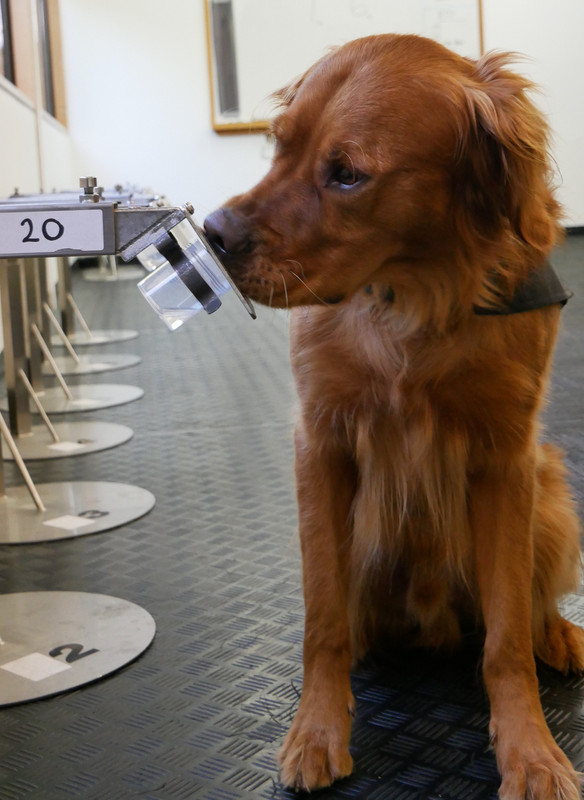Prostate Cancer Clinical Trials
UPDATE: October 2025. It is with great regret that due to a lack of funds we are unable to continue with our Prostate Cancer research. We hope this will change in the future, allowing K9MD to continue with our aim:-
AIM: Working alongside a full scientific and clinical team it is K9 Medical Detection New Zealand's aim to create a simple diagnostic urine test as a value-added tool in the fight against Prostate cancer. To support any current tests, to help prioritise patients and to offer a non-invasive early test for all ages assisting medical professional in their patient pathway decision making.
BACKGROUND: In New Zealand, prostate cancer is the most common cancer in men. Based on the statistics from the Ministry of Health 2010 – 2012, there are around 3,129 registrations each year and approximately 607 deaths each year.
Men who develop prostate cancer are mostly over the age of 65. It rarely occurs in men younger than 55. About one in 13 men will develop prostate cancer before the age of 75. In very elderly men, prostate cancer often grows very slowly and may cause no symptoms.
Some men are more at risk of getting prostate cancer than others, but the most important risk factor is ageing. Men with a family history of prostate cancer have a higher risk; that is, if their father, an uncle or a brother has had prostate cancer.
Doctors do not know what causes prostate cancer. They do know, however, that the growth of cancer cells in the prostate is stimulated by male hormones, especially testosterone. Most prostate cancer growth is influenced by testosterone.
The speed at which prostate cancer grows varies from man to man. In some men the cancer grows very slowly; in other men, it grows more rapidly.
A cancer is often very hard to find when it is located only within the prostate. This is because it may not cause symptoms and may be too small for a doctor to feel during a routine rectal exam. A man with slow-growing prostate cancer may live for many years and die of other causes, without ever having symptoms of prostate cancer. If the cancer grows too much, however, the prostate usually squeezes the urethra, which it surrounds. Symptoms may then start, such as difficulty in passing urine. As the same symptoms can be caused by other problems, difficulty in passing urine does not always mean that prostate cancer is present.
SCREENING AND EARLY DETECTION OF PROSTATE CANCER
Early detection of prostate cancer is important as this cancer is most treatable when detected while contained within the prostate gland before it spreads to other parts of the body.
The New Zealand Ministry of Health Prostate Cancer Management and Referral Guidance indicates the procedures for men looking to be tested for prostate cancer.
Regular prostate checks are important for men who:
Are over the age of 40 if there is a family history of prostate cancer;
Are older than 50, but younger than 70.
There are two simple tests for prostate cancer and it is recommended that both are done each year.
The PSA blood test is a simple test than can be done in conjunction with other blood tests (e.g. cholesterol) as part of a routine health check-up.
The Digital Rectal Examination (DRE) is a physical examination where the doctor checks the size, shape and hardness of the prostate gland by inserting a gloved finger in to the rectum.
Men having any problems such as pain, fever, swelling of the prostate and, blood and pus in the urine, or problems passing urine should consult their doctor without delay.
RESEARCH TRIAL:
K9 Medical Detection NZ has strict protocols and robust methodologies for all medical detection trials. Research trials are led by Professor Sarah Young in conjunction with Associate Professor Michelle McConnell as Research Project Manager and K9MD Director Pauline Blomfield. K9 Medical Detection have clinical facilities in Dunedin including five r laboratories for the safe handling and storing of all medical samples.
K9 Medical Detection NZ, (K9MD) believes this is the way forward for early detection, to offer New Zealand men an easy, non-invasive diagnostic test for prostate cancer. This would be a value-added tool to help protect men’s health, to enable earlier instigation of treatment and potentially lead to improved patient outcomes.
K9MD Freida (German shepherd)has completed the Proof-of-Concept blind randomised Validation testing 200 samples over 5 consecutive days. Held under strict guidelines with the study design and data analysis completed by a Biostatistician, Freida achieved 100% success sensitivity (identifying all samples with Prostate Cancer) and 100% success specificity (ignoring all samples without cancer).
K9MD Magic (Rustic Retriever)has completed the Proof-of-Concept blind randomised Validation. Held under the same conditions Magic tested 300 samples and achieved 87.7% sensitivity and 98.8% specificity success.
K9MD Ace (Springer spaniel) has also completed the Proof-of Concept blind randomised Validation. Testing 300 samples Ace achieved 90% sensitivity and 97.0% specificity.
All dogs will now progress to the Diagnostic Test Accuracy stage testing patient urine samples. Ethics approval has been received and we will commence collecting samples from Canterbury and Southland early 2024.
It is hoped that the findings from this research will assist in the development of a new early diagnostic alternative for prostate cancer in New Zealand.




